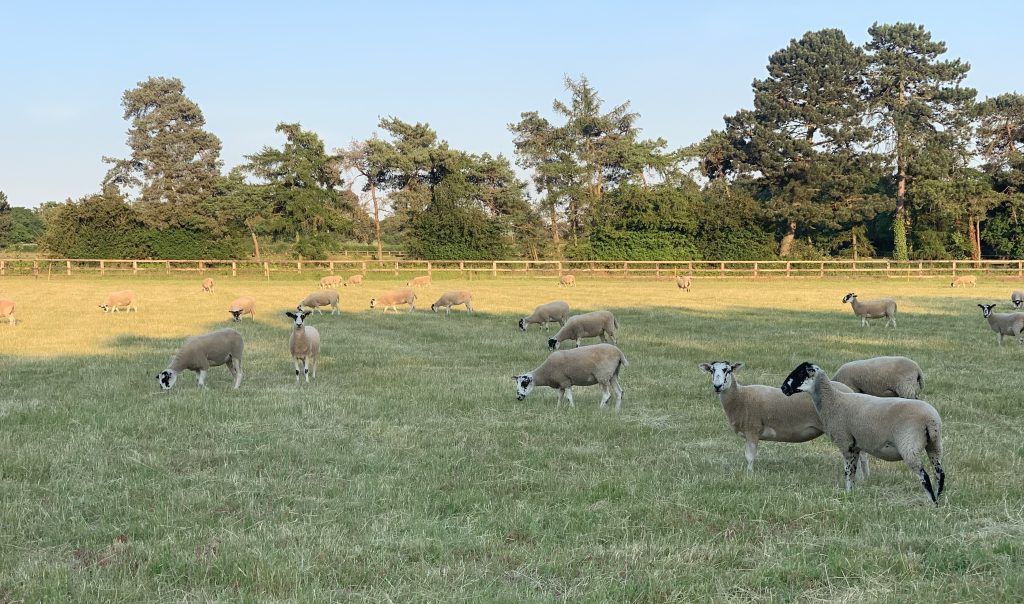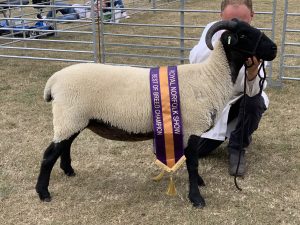Hamish Beaton, East Anglian sheep farmer at Neil Beaton and Son Farming Partnership and livestock fieldsman for Anglia Quality Meat (AQM), has reaped the rewards of proactive bolusing over the last decade.
Along with his parents, Neil and Jilly, who started the farm business in the nineties, Hamish is targeting flock expansion without increasing labour units.
“When my parents moved here, they had an early lambing flock of Suffolk and North Country mules. We now run 40 pedigree Norfolk Horn ewes that we show, and then buy-in 180 NEMSA-registered North Country mule ewe lambs and Suffolk cross North Country mule ewe lambs”, explains Hamish.
“We buy everything in the autumn, run them dry over the grazing season, and sell them in the summer as breeding replacements. We source the North Country mules through Northwest Auctions and buy them direct off farms in Cumbria. The Suffolk cross North Country mule lambs are then purchased off a farm in the midlands.”, adds Hamish.
“The pedigree sheep are kept on the main farm, but the mule ewe lambs are all grazing on horse studs around Newmarket. We’ve always grazed our dry sheep on studs which has always worked well. When I got back from university, I was keen to increase numbers without increasing labour units, which is when we expanded this part of the business”.
“With the horses being on ‘lighter’ land, the ground can be deficient in copper. The sheep are all on strictly grass diets on an extensive system – with no cake, fodder beet, lick buckets or hay – as we’re not allowed to put those out on the stud fields”.
After graduating with a BSc (Hons) in Agriculture at Harper Adams University, Hamish went on to work at the home farm as well as on a few local farms, before joining AQM in 2021 as a livestock fieldsman.
“I always enjoyed marketing and valuing livestock and did a lot of stock judging with young farmers which drew me to AQM in 2021. AQM are agents for ANIMAX Tracesure®, but that’s not to take away from my genuine endorsement of the product. We’ve actually been bolusing our sheep for about 10 years, so before I started with AQM”, explains Hamish.
Farm facts
- Farming a total of 160 hectares, mainly made up of horse stud grazing
- Mixed clay and sandy soils
- Grow a mixture of GS4 mixed grass, perennial rye grasses and some permanent pasture
Proactive bolusing programme
“We were getting a few problems with growth and fertility and wanted to have a constant level of trace elements in them at all times. So, we now bolus everything twice a year”.
“On the pedigree flock, we bolus 8 weeks before tupping and 6 weeks before lambing. On the dry flock, we bolus in November and in early April. I time bolusing with when I sort the ewes into tupping groups and then before lambing when I am vaccinating, and it is very easy to do. With a lot of them being out on the stud yards, we can bolus and forget about them to a degree”.
“We saw a definite benefit in colostrum quality and noticed fewer issues with watery mouth and things like that. We also saw a slight improvement in scanning percentages and get tighter flushing and lambing periods. I can’t definitely say it’s the bolus, but I’d be pretty confident that getting the right minerals every day has helped”.
“We went for ANIMAX Tracesure because we liked it’s leaching or diffusion properties. I know that any changes to diet or lifestyle is not going to affect absorption rate, unlike dissolving boluses or the ones that knock into each other”.
“We have regular shearling ewe customers that want to know what they’ve been bolused with over the 9 months we graze them over the studs. So bolusing is now a custom practice for us”, concludes Hamish.
Lauren Evans, territory manager ANIMAX covering the South Wales and South Central England, reviews.
“It’s great to see that health and performance has improved for Hamish’s flock, especially the increased colostrum quality granting newborn lambs a better start in life”, explains Lauren.
“According to AHDB, 15 percent of UK lambs are lost from scanning to rearing. According to a study from Meat Promotion Wales (HCC), 49 percent of UK lamb losses occur in the first 48 hours of lambing. Ewe nutrition – including trace element supplementation – is essential to meeting the demands on the ewe, and to aid the reduction in neonatal disease and early lamb losses”.
“We mustn’t forget the pre-tupping supplementation that Hamish undertakes to ensure his flock is primed for a successful mating. For the stock which is sold for breeding, Hamish ensures they have met their growth targets and can face the variability in trace element availability on other farms as they move to pastures new”, concludes Lauren.



